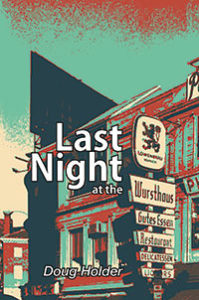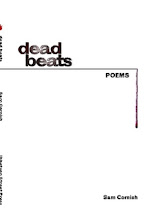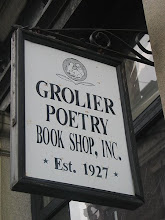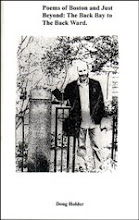Poems
by Martha Boss
BOSSPRESS
22
Pages
Price:
negotiable
Review
by Dennis Daly
Even
the title of this enchanted canvas-covered chapbook by Martha Boss comes alive
with unruly brashness. The second “c” in Crocodiles has moved over and embraced
the second “o” creating what looks like a rebellious liaison that bubbles
forward into the book proper. Retro typos like this happen in the alternative
production universe of the Hermes Rocket typewriter, circa 1987, used by Boss
to manually type out each finished and unique page.
Big
subjects like war and peace Boss delves into with gonzo gusto. In her opening
poem, Domestic War Declaration, she internalizes the struggle for poetic
expression in biological terms. The poet makes contradictory points in an ever
contrasting, yet surprisingly sophisticated, context,
inspiration.
i
don’t want holy crap
occupying
my forever
terroristic
globe
my
cerebrum my lobes my
hemispheres
my cranium of wars.
i
want peace for my faculties.
peace.
after trillions of
cells
have clashed &
collapsed.
then
i want them to get up
&
start trouble all over again.
Many
of Boss’ poems begin with homespun observations, lulling the reader with over
simplified logic. In the meantime each line adds accoutrements of detail,
building into an elegant but wickedly funny metaphor. Boss’ piece Bad Poem
progresses like that. A black ant crosses a cement walk. The poet stirs in
traits of focus and determination and then, with a wink, conjures up her
infernal vision. Consider these lines leading to an arms race,
…black
ants with stingers.
these
nano batteried pests
could,
in the right hands,
&
equipped with just
the
right insecticide
drive
an enemy crazy.
that
is, until the enemy
got
their own.
Crocodiles,
the title poem, opens definitively with the poet admitting, “I don’t like
crocodiles.” That may be true but the cover of this chapbook with its geometric
designs looks suspiciously crocodilish. As Boss follows the escape saga of a
crocodile from the Gaza zoo and its life on the lam, her irrepressible wit
takes over and the poem turns political with a vengeance. Boss concludes the
piece with some pretty funny lines that do nothing if not clarify,
in
a way
the
crocodile
is
an enviable creature
pure
& simple.
malice
is not
a
forethought
or
an afterthought.
it
likes to
slosh
around
in
your dirty water
&
eat yr pets.
&
it doesn’t say
It
did it
For
peace.
Petty
bureaucrats beware. Boss has your number. Indeed, in a poem wonderfully titled Uh
Oh Here She Comes, the poet nails her subject. Without doubt this is my
favorite poem in the collection. The piece begins at the chapbook’s center
where the staples, hidden by green twine, secure the pages. As the poem’s
anxious protagonist awaits judgment humbly, an inspector of apartments, sent by
the city housing department, checks the closets and the drawers, and exhibits
the superior air common to many operatives from the lower rungs of officialdom.
Boss details the inspection procedure with humor and consternation, and
balances the two perfectly. Here’s a bit of the description from the heart of
the poem,
she
has her big clip board
&
big pen.
she
opens & closes & peeps
&
peers.
she
looks like, & i have
endowed
her with, all the
attributes
of the chinese
communist
police.
she
has precise puppet
movements
& a very pointy
forefinger.
i
have a very funny feeling.
After
hearing that Edvard Munch’s painting, The Scream, sold for 130 million dollars,
Boss ponders the logic and importance of repressed language in her poem entitled
Scream. With just a dash of wit the poet describes the artistic conundrum in
words both childlike and profound,
2
short screams mean just in
case
you didn’t know it i’m here.
1
medium scream is i’ll
probably
need you to play with me.
one
long scream is no, you’re
not
doing it right. the block
goes
here.
some
people become expert
at
not saying
what
should be said.
some
become congressmen.
how
often we are
governed
by words
that
replaced the sound
that
could have been
a
famous painting.
Like
most consumers Boss celebrates gadgets that work. Her poem I’m Wearing a New
Watch drives home a capitalistic point of personal pride as well as the
importance of good maintenance that supports systems which numerous dependents
rely on—such as an elevator. Screechy ones just won’t do. Got it? Well, I
didn’t. Boss’ persona then takes a left turn while speaking to an elderly
couple on an elevator she shares with them and joins them in an ideological
collaboration. The poet expresses her doubts and arguably invents a new right
for human kind. Boss continues her narration,
i
say” it doesn’t sound good.”
they
both say, “no, not good.”
the
three of us.
all
for one.
freedom
from being stuck
in
what doesn’t work .
machines
&
ideologies.
i’m
grateful for my
comrades
in conscience.
Did
Boss really call them “comrades?” She does sneak up on you with her more
serious verses. The poet concludes the same poem this way,
they
smile.
smiles
of wisdom
with
age.
i
smile.
i
show them.
my
watch,
made
in china.
Boss’
poems remind me of the English poet Stevie Smith. Not the style or the formal
manner, but the temperament. Both can twist their readers into cognitive
pretzels. Boss reads her pieces at low key venues in Cambridge (usually Stone
Soup) and Somerville. Her self-constructed books (now collectors’ items) she stashes
away unless asked. Do ask. You’ll thank yourself later.

































No comments:
Post a Comment